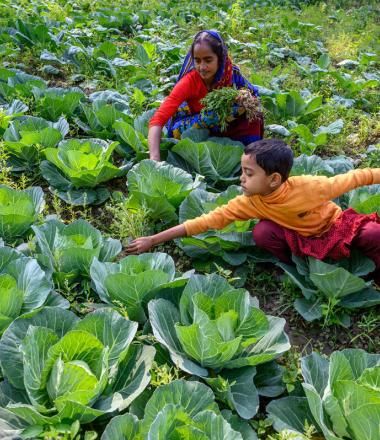
Livelihoods Technical Library
Global Livelihoods Resources and Programmatic Tools
World Vision has many resources available so you can learn more about our livelihoods work and technical approaches. You can view or download any of the resources and programmatic tools below:
- Livelihoods Overview: This fact sheet provides an overview of our approach to the Livelihoods sector.
- Livelihoods Technical Capacity Statement: World Vision works to address the root causes of poverty by building sustainable livelihoods by building sustainable income, assets, access to finance and markets, so that parents and caregivers can provide well for their children now and in the future.
Livelihoods Core Project Models
Building Secure Livelihoods
- Building Secure Livelihoods Overview: The Building Secure Livelihoods (BSL) project model provides a comprehensive pathway out of poverty for families to improve their livelihoods to levels that are productive and resilient enough to survive a range of shocks and stresses.
Microfinance
- Microfinance Overview: The Microfinance project model provides the formal financial assistance that rural families need. This can include loans for seeds, irrigation kits and fertiliser, savings accounts, and insurance for health, life, and crops, all delivered with high standards of service.
Savings for Transformation
- Savings for Transformation Overview: A savings group is member-owned and composed of a small number of people who save together in a safe, convenient and flexible way.
- Savings for Transformation Design Guide: This Savings for Transformation (S4T) model design guidance outlines the recommended process and minimum standards for adopting the S4T model in a programme or project. (English | French | Spanish)
- Savings for Transformation Implementation Guide: The S4T Implementation Guide provides guidance to World Vision staff and partners on how to plan and implement the World Vision Savings for Transformation (S4T) Core Project Model. (English | French | Spanish)
Ultra-poor Graduation
- Ultra-poor Graduation Overview: Ultra-Poor Graduation programmes provide extremely poor households with a pathway out of poverty by helping families engage in a productive and resilient livelihood. This programme gradually builds household capacity and empowers families to become involved with the local economy and community in productive and positive ways.
- Ultra-poor Graduation Handbook: The Ultra-Poor Graduation Handbook provides guidance to World Vision staff on how to plan and implement the World Vision Ultra-Poor Graduation Project Model, which builds on the core principles of the Graduation approach and adapts it to existing World Vision programming and business processes.
Additional Approaches:
Market Systems Development
- Market Systems Development Toolkit: This toolkit provides practical guidelines for World Vision (WV) programs on how to apply a more systemic lens to their livelihood, economic, and private sector development portfolios. The toolkit achieves this through providing a series of worksheets which can be used by project staff during the program design and implementation phases.
Women's Economic Empowerment (WEE) Framework and Program Quality Assurance Standards (PQAS):
- WEE Framework and PQAS Briefing Paper: This provides an overview of the WEE Framework, World Vision approach, indicators and evidence. It also provides a summary of the PQAS to promote WEE outcomes across the project cycle.
- WEE Framework and PQAS Implementation Note: This provides a short overview of the WEE framework and PQAS for field staff. There is a summary of each of the 10 standards during proposal development, design and assessment, implementation, monitoring and evaluation, including key tools and case studies.
- WEE Framework and PQAS Manual: This provides the full technical guidance including an overview of the framework and PQAS. Each PQAS includes learning outcomes, tools and checklists and case studies. These tools and checklists can be printed out separately for program teams to fill in. (Tools and Checklist for Printing)
- WEE Indicator Guidance and Tools: This provides the full WEE indicator guidance and tools linked to women’s economic advancement, access, agency and equitable systems.
WEE Impact Briefs
- Nutrition Sensitive Value Chains for Smallholder Farmers (NSVC) Project Impact Brief: This brief summarises the results from a mid-term evaluation (MTE) completed by Data Management Aid. It includes key results and lessons linked to WEE.
- Gender and Disability Inclusive Economic Development (iLIVE) Project Impact Brief: This brief summarises the results from the iLIVE end-of-project evaluation. It includes key results and lessons linked to WEE.
Gender Inclusive Financial Literacy Training (GIFT)
- GIFT manual: GIFT is a non-biased, gender-inclusive financial literacy training package targeted at couples. The GIFT activity aims to increase women and men’s access to financial literacy skills, while also promoting women's voices in financial decision making alongside her partner.
- GIFT Technical Note: This aims to provide a checklist of key things to consider when planning to implement GIFT activities as part of an economic development program.
Learn more about World Vision's Livelihoods programmatic approaches or contact us at livelihoods@wvi.org.
